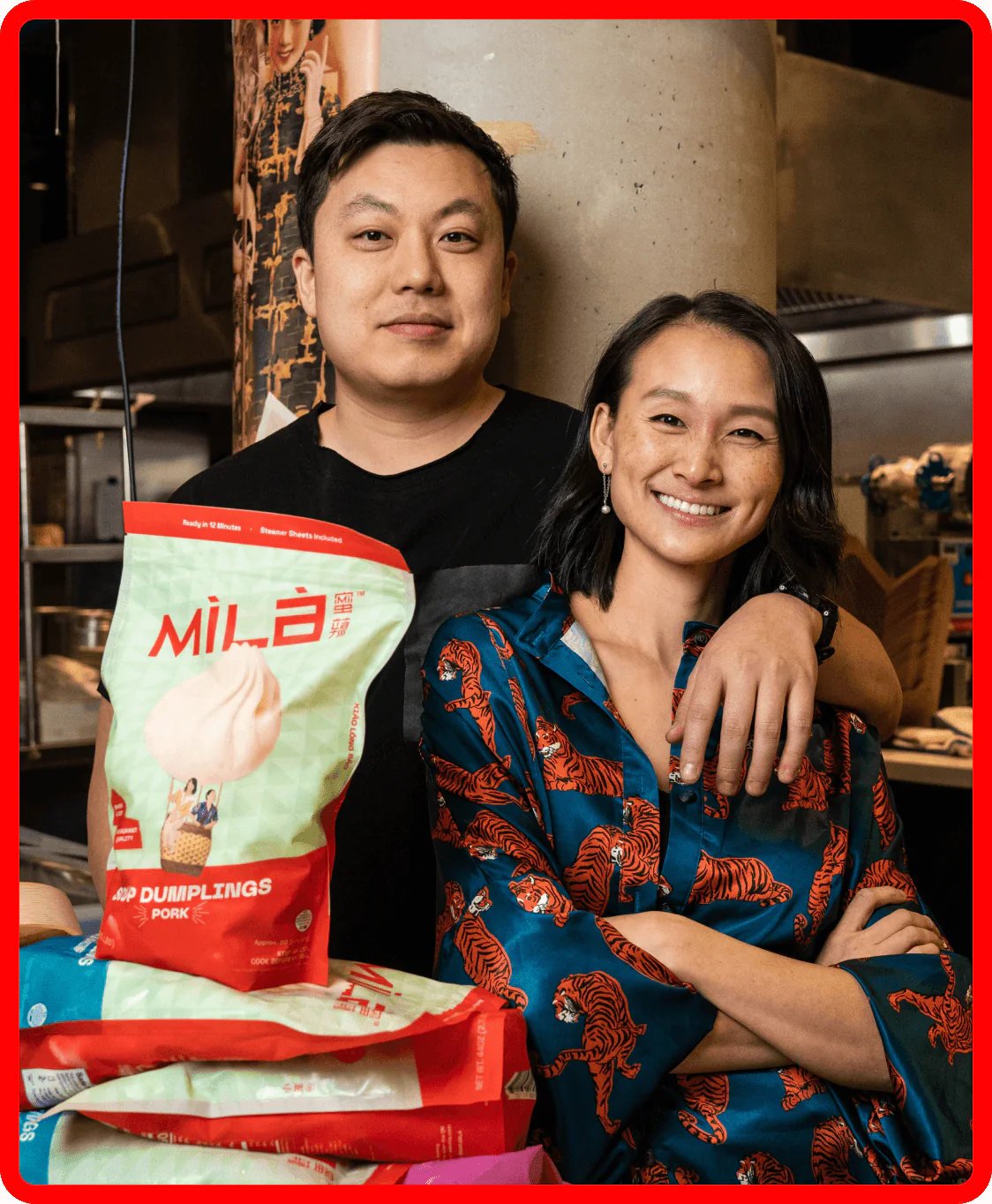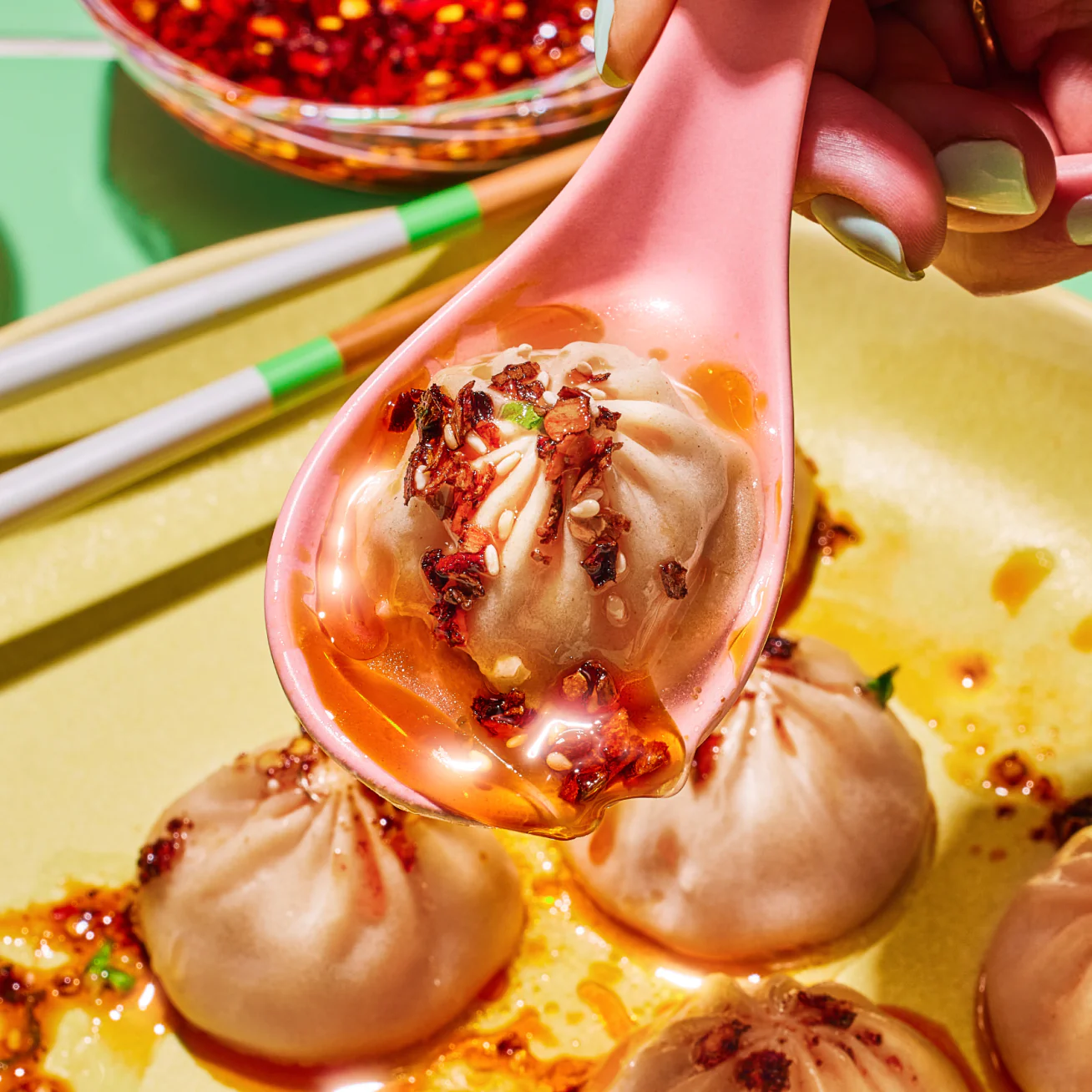We sat down with Jennifer Liao, cofounder and CEO of MìLà, a direct-to-consumer, modern Chinese food company based in Washington. In 2018, Jen left her career in healthtech behind to open a brick-and-mortar restaurant serving street foods she grew up loving that couldn’t easily be found in the Seattle area. A pivot to local deliveries during the pandemic opened up a new perspective on what the business could be and has since grown into a viral sensation, shipping more than 10 million dumplings nationwide and is setting their sights on grocery store aisles next.
With a successful round of fundraising in the books, a recent rebrand, and Marvel star Simu Liu on board, Jennifer shares her vision for what MìLà can do and represent.
Listen to the episode or check out some highlights below:
In its initial form, MìLà was a restaurant. Prior to that, you were working in health tech. Why get into the restaurant business?
Jennifer: It really started as a selfish motivation. I want to eat really great Chinese street food. I miss it and can't find a lot of the items that I grew up with here.
I had a friend, Norman, he's one of our co-founders. He had asked, "Hey, do you wanna start a poké restaurant together?" and I'm allergic to fish. So I said no to that one. He came back and was like, "I still want to work together with you on something." And at first I said, can you open this type of restaurant that has Chinese street food so I can come eat it all the time?
Every week, we were getting on these brainstorm calls on how to make it happen and after a few months I'm like, I don't know what happened but now I'm 100% involved in this. We opened the restaurant in 2018 and that was the main motivator for the type of cuisine that we were going for.
Outside of that, from a business perspective, I think I was very interested in just a very different industry, a different type of business, something that I was working on wholly versus doing one single role and function within a much larger company. This was really expansive across everything and trying to figure it out. So it was also a way to understand myself.
At what point did the vision for the business expand beyond just operating the brick-and-mortar space?
Jennifer: We had started the first one of the mind that this is a beta test. If it goes really well we could open several other restaurants. But we had never really thought about the e-commerce or retail side of things because that's just such a different world.
During COVID, when we had shut down for a few weeks, our chef started to tinker around with a soup dumpling because that's very close to our hero item in the restaurant. We started to freeze them because everyone eats frozen dumplings. So we're like, okay, why wouldn't we do frozen soup dumplings? We did our first test very locally and just started to expand further and further. Along the way, we just saw more demand than there was supply, which is always a very good sign.
We got very lucky with the timing and the product to find product market fit, but also at a time when advertising dollars were very cheap. We were able to do it in a very sustainable, scalable way for the business to be able to expand at that point and take some risks and test it out. So we stumbled upon this perfect product market fit, at exactly the right time when people are at home and they're seeking food because actually buying frozen food online, direct-to-consumer, is not a typical thing at all and just generally food online, even if it's non-frozen, is a pretty small market as it is.

What was your relationship with Chinese food growing up? How has it changed?
Jennifer: Whenever people ask what's your favorite food? Or What would you like to eat? I always answer my mom's cooking. It's not really a whole cuisine necessarily, but it's so familiar for the types of dishes and the flavors and the taste.
Opening the restaurant actually, a couple of her recipes are incorporated there. So we have a Sichuan cabbage, it's almost like kimchi, but it's not fermented and it has Chinese flavors rather than Korean. And so we have that as one of the side dishes and that's incorporated. That was really nice to be able to incorporate part of my childhood and heritage in that.
I think that actually didn't change my view too much, just opening the restaurant, but going into the consumer side of the business actually did push us to think about what does this food represent? What are we putting out there? Why are we putting it out there? What should it look like? How should it taste? Those were forcing functions to really think about the meaning of the food to us.
And even right now, when we're thinking about what products to put out there, it is foods that I would eat myself. [I'm] super busy so it's the product format, the product flavor. It just starts from, there's not all of these options out there. There's lots of restaurants in some of the bi-coastal cities but it doesn't really exist in conventional grocery stores at all.
If we ask our audience, what do you want? They actually don't know how to answer that. And it's very hard to come up with a product roadmap based on what consumers are saying they want, which is more American-Chinese.
When your customer base doesn't know what they want–because this is such an open gap in the market–how do you decide what products to offer next?
Jennifer: For us, we were really looking at continuing more of this street food trend so we looked at street food and then we also looked at what's a summer item that would be good to supplement the product portfolio because soup dumplings are slightly more seasonal.
So we did skewers next. It's also my favorite street food, which is why we did it. Again, this is selfishly motivated. Beyond that, noodles are just something that we had started to think about. We actually were only planning to do Dan Dan noodles at first.
We did a beta test more than a year prior to the actual release. Most people actually still did not know what MaLa spice was (the numbing, tingly spice) which I was surprised by because this was our hometown. This is Seattle. There's a large Asian population, and yet still, the vast majority of our customers did not know what that was.
They were a little bit confused by what they were tasting, and there were lots of requests to remove the spice to make it adjustable or customizable. And unfortunately the spicy piece is a central core pillar of what Dan Dan noodles are. We were asking ourselves, would it be authentic to remove this spice component?
And the answer is no, because that's how the dish is meant to be consumed for what we were making. I think there's lots of different versions of Dan Dan noodles and some of them are more sesame-based, less spicy. But the one that we were doing, which is a Sichuan version, has the mala spice to it.
The solution that we come up with was to release two other noodles that were non-spicy, that could also have people trying it. So we have a sweet and savory zha jiang mian, and then we have a scallion oil noodle, which is a lot more neutral. With this kind of product lineup, everyone can choose what they want versus compromising what the dish is.

Is there a dream item you'd love to at test out with MìLà?
Jennifer: There's lots of dream items. We've released a beef noodle soup dumpling, a lot of people really liked that. I would love to eat beef noodle soup many times a month. That definitely would be on my list. I think Hainan chicken rice is another one that I personally really love eating.
It's a little bit more on the street food theme of things, but I think there's a way to do it very easily with minimal prep, potentially. I personally also really like lu rou fan which is Taiwanese braised pork belly rice.
My dream items are just delicious Chinese foods, period, but easy prep because I am not a great chef. But I want to eat these foods all the time and I don't have time to go seek them out. So selfishly, this is what I'm trying to accomplish and I feel like other people will appreciate the format as well.
The company recently went through a rebrand and it's brought you and Caleb as founders into focus in a pretty personal way. What's that experience been like?
Jennifer: It's interesting because we actually started the process a year and a half ago. A lot of people in our comments when we did it–I think it was overwhelmingly positive–but still some people who questioned why. Is it because you wanted it to be American? Is it gentrification? Is it because you have VC money and they're asking you to do it?
No–we had talked about doing this even before any fundraising because we wanted to be a broader Chinese food company, not just street food. And we wanted to it to represent all parts of us. And so Mila was actually, if we had a daughter, we would've named her Mila. We ended up having a son.
When we knew we were having a son, it felt like this name could really fit our company. It's both two Chinese words and also an English word. So it has that duality piece to it. It is spicy and sweet [honey (mì 蜜) and spice (là 辣)]. And it could be both of those, neither of those, anywhere in between. This company could choose to be whatever it wanted and that felt good to us.
People questioned why we did it. They were like Xiao Chi Jie is much more Chinese, why are you abandoning your roots? I think the heart of it is, those are our roots but it's not a hundred percent of us, right?
We are Chinese and that's where we come from. And that's the third culture piece–this is where we started and it's incorporated but it's not a hundred percent of who we are. We've evolved from that. There's lots of other influences. There's a lot of evolved thinking and evolved tastes and we want that to be part of the story. This is a starting point. So that's exactly how we wanted it to be reflected.
You've also now brought on famous Marvel actor Simu Liu as Chief Creative Officer. What has that enabled in how MìLà tells its story?
Jennifer: Simu joining us is really great because I think we can expand the way that we talk about things. I think there's a way to reach people in a very different way. There's different audiences that are reached, there are different people that you can bring to the table to shine a light on what's going on as well as Chinese food and Chinese culture.
That was what was really important to us–it's another voice that can tell a similar story, a different story, and bring other people into the fold. We want to invite people to the table to talk about it, even if they aren't Chinese or Chinese-American or maybe don't have experience with it. How can we get them to think about it and welcome it and embrace it? That's really the point.
When you zoom out of the day-to-day operations of the business, what would you like to see MìLà achieve and what would you like its legacy to be?
Jennifer: When we first started, it was just to have really great food and I think as we've gone, we've encountered a lot of things that we weren't aware of necessarily. A lot of suppliers and vendors and infrastructure have evolved very differently for ethnic grocery stores versus conventional grocery stores.
And there's little crossover in the way that they're set up because of the certifications, regulations. The way things that are talked about or marketed are also completely different. We want to be able to bridge that a little bit and evolve the infrastructure in a way that makes it a lot easier for other people to also create this food and try this food.
Learn more about MìLà at eatmila.com
Save 20% on TeuxDeux with code SOMEDAYLIST.
